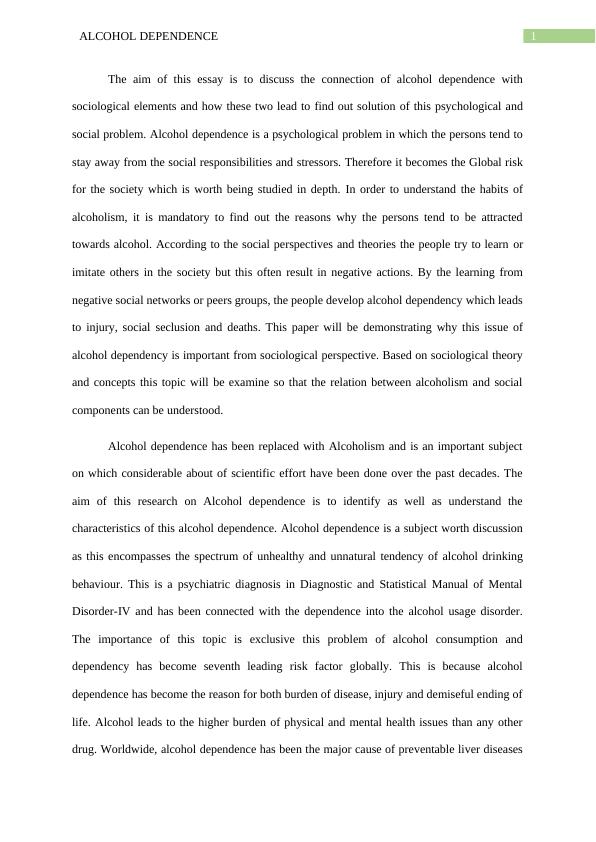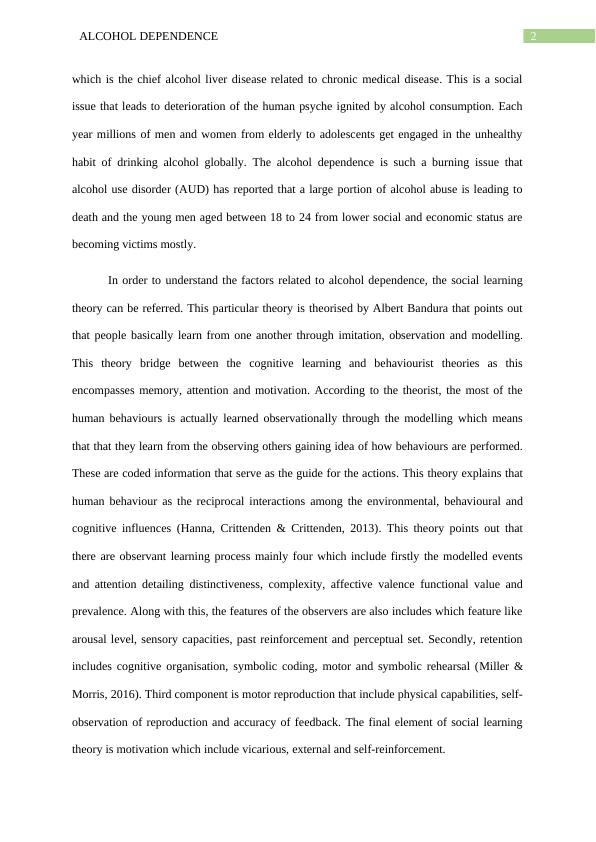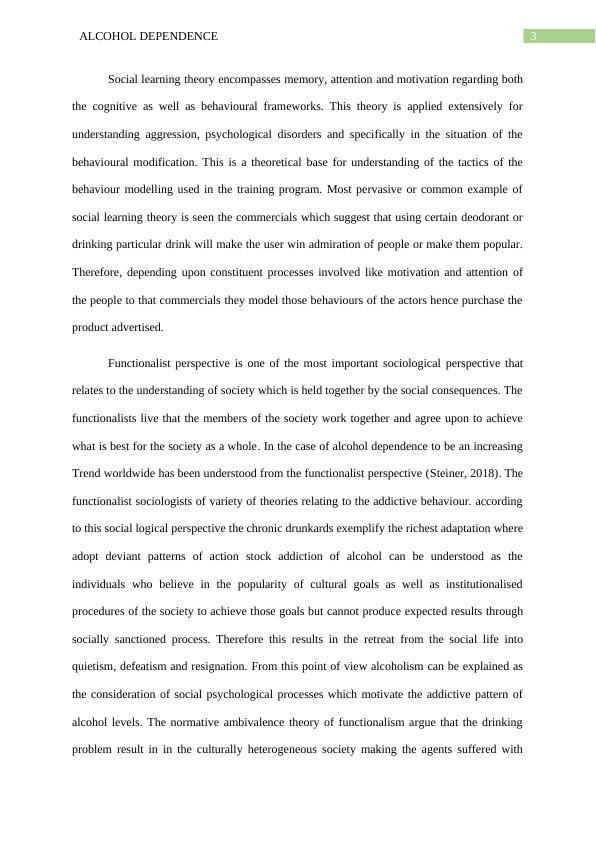Alcohol Dependence and Sociological Elements
Added on 2023-03-31
11 Pages2391 Words244 Views
Running head: ALCOHOL DEPENDENCE
ALCOHOL DEPENDENCE
Name of the Student:
Name of the University:
Author Note:
ALCOHOL DEPENDENCE
Name of the Student:
Name of the University:
Author Note:

1ALCOHOL DEPENDENCE
The aim of this essay is to discuss the connection of alcohol dependence with
sociological elements and how these two lead to find out solution of this psychological and
social problem. Alcohol dependence is a psychological problem in which the persons tend to
stay away from the social responsibilities and stressors. Therefore it becomes the Global risk
for the society which is worth being studied in depth. In order to understand the habits of
alcoholism, it is mandatory to find out the reasons why the persons tend to be attracted
towards alcohol. According to the social perspectives and theories the people try to learn or
imitate others in the society but this often result in negative actions. By the learning from
negative social networks or peers groups, the people develop alcohol dependency which leads
to injury, social seclusion and deaths. This paper will be demonstrating why this issue of
alcohol dependency is important from sociological perspective. Based on sociological theory
and concepts this topic will be examine so that the relation between alcoholism and social
components can be understood.
Alcohol dependence has been replaced with Alcoholism and is an important subject
on which considerable about of scientific effort have been done over the past decades. The
aim of this research on Alcohol dependence is to identify as well as understand the
characteristics of this alcohol dependence. Alcohol dependence is a subject worth discussion
as this encompasses the spectrum of unhealthy and unnatural tendency of alcohol drinking
behaviour. This is a psychiatric diagnosis in Diagnostic and Statistical Manual of Mental
Disorder-IV and has been connected with the dependence into the alcohol usage disorder.
The importance of this topic is exclusive this problem of alcohol consumption and
dependency has become seventh leading risk factor globally. This is because alcohol
dependence has become the reason for both burden of disease, injury and demiseful ending of
life. Alcohol leads to the higher burden of physical and mental health issues than any other
drug. Worldwide, alcohol dependence has been the major cause of preventable liver diseases
The aim of this essay is to discuss the connection of alcohol dependence with
sociological elements and how these two lead to find out solution of this psychological and
social problem. Alcohol dependence is a psychological problem in which the persons tend to
stay away from the social responsibilities and stressors. Therefore it becomes the Global risk
for the society which is worth being studied in depth. In order to understand the habits of
alcoholism, it is mandatory to find out the reasons why the persons tend to be attracted
towards alcohol. According to the social perspectives and theories the people try to learn or
imitate others in the society but this often result in negative actions. By the learning from
negative social networks or peers groups, the people develop alcohol dependency which leads
to injury, social seclusion and deaths. This paper will be demonstrating why this issue of
alcohol dependency is important from sociological perspective. Based on sociological theory
and concepts this topic will be examine so that the relation between alcoholism and social
components can be understood.
Alcohol dependence has been replaced with Alcoholism and is an important subject
on which considerable about of scientific effort have been done over the past decades. The
aim of this research on Alcohol dependence is to identify as well as understand the
characteristics of this alcohol dependence. Alcohol dependence is a subject worth discussion
as this encompasses the spectrum of unhealthy and unnatural tendency of alcohol drinking
behaviour. This is a psychiatric diagnosis in Diagnostic and Statistical Manual of Mental
Disorder-IV and has been connected with the dependence into the alcohol usage disorder.
The importance of this topic is exclusive this problem of alcohol consumption and
dependency has become seventh leading risk factor globally. This is because alcohol
dependence has become the reason for both burden of disease, injury and demiseful ending of
life. Alcohol leads to the higher burden of physical and mental health issues than any other
drug. Worldwide, alcohol dependence has been the major cause of preventable liver diseases

2ALCOHOL DEPENDENCE
which is the chief alcohol liver disease related to chronic medical disease. This is a social
issue that leads to deterioration of the human psyche ignited by alcohol consumption. Each
year millions of men and women from elderly to adolescents get engaged in the unhealthy
habit of drinking alcohol globally. The alcohol dependence is such a burning issue that
alcohol use disorder (AUD) has reported that a large portion of alcohol abuse is leading to
death and the young men aged between 18 to 24 from lower social and economic status are
becoming victims mostly.
In order to understand the factors related to alcohol dependence, the social learning
theory can be referred. This particular theory is theorised by Albert Bandura that points out
that people basically learn from one another through imitation, observation and modelling.
This theory bridge between the cognitive learning and behaviourist theories as this
encompasses memory, attention and motivation. According to the theorist, the most of the
human behaviours is actually learned observationally through the modelling which means
that that they learn from the observing others gaining idea of how behaviours are performed.
These are coded information that serve as the guide for the actions. This theory explains that
human behaviour as the reciprocal interactions among the environmental, behavioural and
cognitive influences (Hanna, Crittenden & Crittenden, 2013). This theory points out that
there are observant learning process mainly four which include firstly the modelled events
and attention detailing distinctiveness, complexity, affective valence functional value and
prevalence. Along with this, the features of the observers are also includes which feature like
arousal level, sensory capacities, past reinforcement and perceptual set. Secondly, retention
includes cognitive organisation, symbolic coding, motor and symbolic rehearsal (Miller &
Morris, 2016). Third component is motor reproduction that include physical capabilities, self-
observation of reproduction and accuracy of feedback. The final element of social learning
theory is motivation which include vicarious, external and self-reinforcement.
which is the chief alcohol liver disease related to chronic medical disease. This is a social
issue that leads to deterioration of the human psyche ignited by alcohol consumption. Each
year millions of men and women from elderly to adolescents get engaged in the unhealthy
habit of drinking alcohol globally. The alcohol dependence is such a burning issue that
alcohol use disorder (AUD) has reported that a large portion of alcohol abuse is leading to
death and the young men aged between 18 to 24 from lower social and economic status are
becoming victims mostly.
In order to understand the factors related to alcohol dependence, the social learning
theory can be referred. This particular theory is theorised by Albert Bandura that points out
that people basically learn from one another through imitation, observation and modelling.
This theory bridge between the cognitive learning and behaviourist theories as this
encompasses memory, attention and motivation. According to the theorist, the most of the
human behaviours is actually learned observationally through the modelling which means
that that they learn from the observing others gaining idea of how behaviours are performed.
These are coded information that serve as the guide for the actions. This theory explains that
human behaviour as the reciprocal interactions among the environmental, behavioural and
cognitive influences (Hanna, Crittenden & Crittenden, 2013). This theory points out that
there are observant learning process mainly four which include firstly the modelled events
and attention detailing distinctiveness, complexity, affective valence functional value and
prevalence. Along with this, the features of the observers are also includes which feature like
arousal level, sensory capacities, past reinforcement and perceptual set. Secondly, retention
includes cognitive organisation, symbolic coding, motor and symbolic rehearsal (Miller &
Morris, 2016). Third component is motor reproduction that include physical capabilities, self-
observation of reproduction and accuracy of feedback. The final element of social learning
theory is motivation which include vicarious, external and self-reinforcement.

3ALCOHOL DEPENDENCE
Social learning theory encompasses memory, attention and motivation regarding both
the cognitive as well as behavioural frameworks. This theory is applied extensively for
understanding aggression, psychological disorders and specifically in the situation of the
behavioural modification. This is a theoretical base for understanding of the tactics of the
behaviour modelling used in the training program. Most pervasive or common example of
social learning theory is seen the commercials which suggest that using certain deodorant or
drinking particular drink will make the user win admiration of people or make them popular.
Therefore, depending upon constituent processes involved like motivation and attention of
the people to that commercials they model those behaviours of the actors hence purchase the
product advertised.
Functionalist perspective is one of the most important sociological perspective that
relates to the understanding of society which is held together by the social consequences. The
functionalists live that the members of the society work together and agree upon to achieve
what is best for the society as a whole. In the case of alcohol dependence to be an increasing
Trend worldwide has been understood from the functionalist perspective (Steiner, 2018). The
functionalist sociologists of variety of theories relating to the addictive behaviour. according
to this social logical perspective the chronic drunkards exemplify the richest adaptation where
adopt deviant patterns of action stock addiction of alcohol can be understood as the
individuals who believe in the popularity of cultural goals as well as institutionalised
procedures of the society to achieve those goals but cannot produce expected results through
socially sanctioned process. Therefore this results in the retreat from the social life into
quietism, defeatism and resignation. From this point of view alcoholism can be explained as
the consideration of social psychological processes which motivate the addictive pattern of
alcohol levels. The normative ambivalence theory of functionalism argue that the drinking
problem result in in the culturally heterogeneous society making the agents suffered with
Social learning theory encompasses memory, attention and motivation regarding both
the cognitive as well as behavioural frameworks. This theory is applied extensively for
understanding aggression, psychological disorders and specifically in the situation of the
behavioural modification. This is a theoretical base for understanding of the tactics of the
behaviour modelling used in the training program. Most pervasive or common example of
social learning theory is seen the commercials which suggest that using certain deodorant or
drinking particular drink will make the user win admiration of people or make them popular.
Therefore, depending upon constituent processes involved like motivation and attention of
the people to that commercials they model those behaviours of the actors hence purchase the
product advertised.
Functionalist perspective is one of the most important sociological perspective that
relates to the understanding of society which is held together by the social consequences. The
functionalists live that the members of the society work together and agree upon to achieve
what is best for the society as a whole. In the case of alcohol dependence to be an increasing
Trend worldwide has been understood from the functionalist perspective (Steiner, 2018). The
functionalist sociologists of variety of theories relating to the addictive behaviour. according
to this social logical perspective the chronic drunkards exemplify the richest adaptation where
adopt deviant patterns of action stock addiction of alcohol can be understood as the
individuals who believe in the popularity of cultural goals as well as institutionalised
procedures of the society to achieve those goals but cannot produce expected results through
socially sanctioned process. Therefore this results in the retreat from the social life into
quietism, defeatism and resignation. From this point of view alcoholism can be explained as
the consideration of social psychological processes which motivate the addictive pattern of
alcohol levels. The normative ambivalence theory of functionalism argue that the drinking
problem result in in the culturally heterogeneous society making the agents suffered with

End of preview
Want to access all the pages? Upload your documents or become a member.
Related Documents
Unhealthy Consumption of Alcohol as a Risk Factor for Non-Communicable Diseaseslg...
|16
|5634
|20
CAUSES AND EFFECTS OF ALCOHOLISM IN MILLENIALSlg...
|5
|1147
|20
Alcohol and Its Effect Assesment Reportlg...
|6
|1759
|33
Public Health Alcohol Misuselg...
|4
|1680
|49
Alcohol Consumption: A Case Study on Alcohol Dependence and its Effects on Physical and Mental Healthlg...
|14
|3728
|318
Alcohol Related Hospital Admission in Deans: A Problem to the Communitylg...
|1
|884
|161
